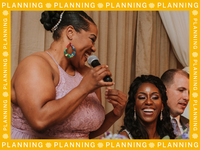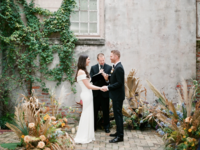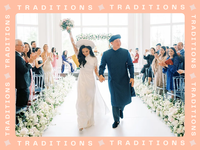The Ceremony Etiquette You (and Your Guests) Should Know if You're Having a Religious Ceremony
Let's face it: Weddings are kind of intimidating for everyone involved. Not only are you (the to-be-wed) putting on the party of your dreams, but your guests are likely nervous about making sure they're on their best behavior for your important day. This goes double if you're having a religious or cultural ceremony that some of your guests may be unfamiliar with.
Obviously, regardless of what kind of ceremony you're having (religious or not), there are basic etiquette requirements your guests should know—for example, be on time and don't be a shutterbug (until the reception, that is).
Again, if you're having a nonsecular ceremony, there are some additional things to note. Most importantly, your guests should know to be respectful (this isn't time for a political statement) and go with the crowd if they're unsure what to do. With regards to specific faiths and denominations, we've outlined practices and etiquette basics you and your guests should know below.
Roman Catholic Weddings
If the couple is having a full mass at a Roman Catholic church, then it will include communion. In the Catholic church, only those who have received the sacrament of the Eucharist (known as First Holy Communion) can partake in communion. Typically, the ushers will indicate, row by row, for guests to come forward to receive communion. Simply remain in your seat if you're not Catholic and don't want to particpate. Or you can always go up to the altar while crossing your arms (resting your hands on the opposite shoulders) for a blessing from the priest instead. (Note: In most other Christian denominations, communion is not included in the wedding ceremony; but if it is, all are usually welcome to participate, regardless of their religious affiliation or status.) Although Catholics may kneel to pray, you're not required to kneel, and can opt to remain seated during prayer. If the ceremony is a Nuptial Mass, it may include the priest calling for the "sign of peace," during which the guests turn to those near them, shake hands and say "peace be with you" or some similar greeting.
Jewish Weddings
Jewish men traditionally wear a yarmulke when in synagogue for religious celebrations; in some sects, it's worn daily. Typically, at a Jewish wedding, yarmulkes are set out on a table outside of the synagogue, and all the male guests attending the wedding are expected to wear one, regardless of their faith. (Either way, you don't have to worry about bringing your own unless you want to.) If it's an Orthodox ceremony, the men and women may be seated in separate areas, so if you're a guest attending with someone of the opposite sex, you can expect to potentially be seated separately during the ceremony.
Mormon Weddings
There are two primary types of Mormon weddings: the temple ceremony and the chapel ceremony. Temple ceremonies take place in Mormon Temples, and only members of the Mormon faith in highest standing may attend. (The ceremony is considered super sacred and isn't typically discussed with non Mormons.) If you're not a Mormon in the highest standing, you won't be invited to the temple ceremony. If a Mormon couple has a temple ceremony, the guests are usually invited only to the reception. Occasionally, couples choose to have a chapel ceremony and "seal" their marriage at a later point with a temple ceremony.



Hindu Weddings
Hindu weddings held in the US are typically much shorter in length than those in India (where they can last several days!). They still do last a few hours (at least), and possibly a weekend, so your guests should know to plan accordingly. Prior to the actual wedding, there's usually a pre-party called the sangeet where family members come together to dance, sing and celebrate (and even put on performances for one another). The ceremony itself will follow a few days later, and will typically begin with a prayer to Ganesha (the god of beginnings and the remover of obstacles).
Muslim Weddings
In Muslim tradition, the wedding ceremony and the public celebration (aka reception) are generally separate events. A Muslim ceremony is actually a brief affair that only lasts a few minutes and usually occurs in an office, the bride's home or a mosque. To some, it might seem more like the signing of a legal agreement than our Western concept of a wedding. The actual party (with family and friends) usually occurs a week or two later. If you're a guest invited to a Muslim wedding, the official ceremony itself will probably have already taken place days before.
Sikh Weddings
Sikh weddings occur in the morning and typically last about an hour and a half (and guests should be prepared to take off their shoes if it's occuring in a Sikh place of worship). After the ceremony ends, the guests greet the newlyweds by adorning them with flowers, throwing petals and placing a hand on their heads. The couple traditionally holds a pink sash that's been placed on them during the ceremony, and guests may put token gifts of money into the cloth.
Other Practices
In many weddings of Western religions, the congregation stands as the bride enters. Just follow the crowd. The to-be-weds' families will undoubtedly stand if that's what the couple wants, and the guests can follow suit. Keep standing until the officiant instructs the congregation to be seated. (You can observe this rule for any other circumstance during the ceremony where you're called upon to stand. As a general rule of thumb, you can plan on standing until you're instructed to be seated.)





















